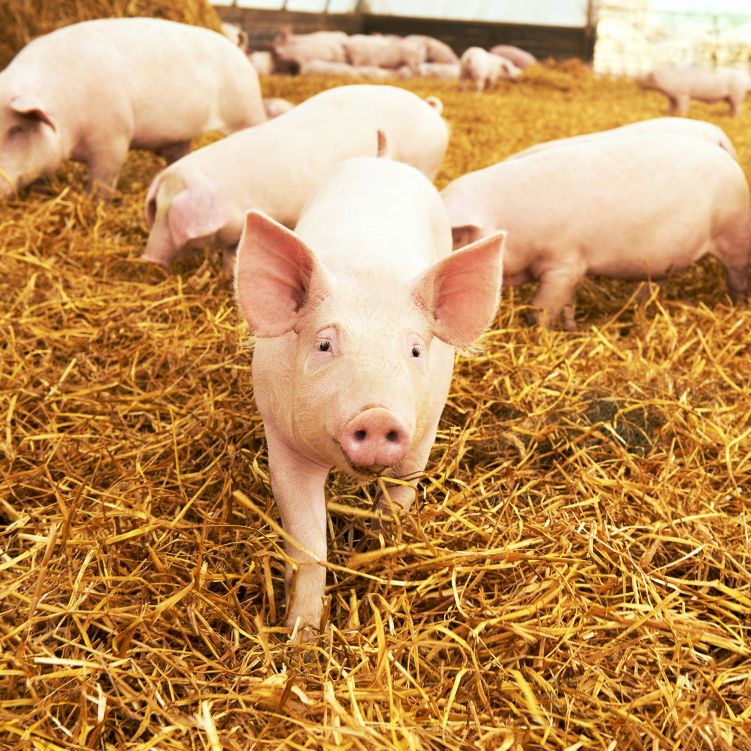Pigs are remarkable animals. Curious, intelligent and social, they possess some truly unique characteristics and abilities. However, the systems pigs are farmed in often mean that these are overlooked or misunderstood.
There are around 2.5 million pigs farmed in Australia at any one time and around 90% of those pigs are housed in intensive farming systems. They are a significant portion of our agricultural industry, yet how much does the average person know about these animals?
Pigs are great communicators.
Pigs are highly communicative animals, they possess a rich vocabulary of over 20 distinct vocalisations depending, for example, on how they’re feeling, how they’re housed and who they’re with. Through grunts, squeals and snorts they express different emotions, such as excitement, distress, contentment, and even warning signals. For instance, a soft grunt often indicates contentment, while a high-pitched squeal may indicate pain or fear. Remarkably, pigs can recognise each other’s voices and even respond differently to familiar or unfamiliar individuals. Pigs also rely heavily on body language, such as ear position, tail movement, and posture, to convey their mood. These advanced communication skills are illustrative of their social intelligence and emphasise the importance of appropriate group housing for good welfare, where pigs can interact with one another and engage in social important social behaviours.
Pigs are clean animals.
Pigs like to keep themselves clean, and when given the option they will not soil the areas where they eat or sleep. They do, however, enjoy muddy wallows which they use to help regulate their body temperature in warmer weather and protect themselves from sunburn, flies, and external parasites. Wallows are a valuable provision for pigs reared outdoors and provide another form of social enrichment as they will often wallow in groups. There’s a reason why we have the saying ‘as happy as a pig in mud’!
Pigs are one of the smartest animal species.
Curious by nature, pigs have the ability to solve complex problems, remember tasks for extended periods, learn from one another, and demonstrate emotional awareness. This intelligence means that pigs require more than just basic physical care, they need a variety of mental stimulation to keep their minds and bodies active, including opportunities for social interaction and play, and an environment that allows natural behaviours such as rooting, exploring, and nesting. Without these provisions, pigs can quickly become bored and frustrated and develop abnormal behaviours such as bar biting or tail biting.
Pigs are highly sensitive creatures.
Pigs possess highly developed sensory abilities. They’re able to detect high frequency sounds and have an exceptional sense of smell which is enabled by their sensitive snouts. A pig’s snout contains a high density of tactile receptors and an olfactory sense around 2,000 times more sensitive than a human’s.
The majority of Australia’s pigs are still suffering on farm.
Most farmed pigs spend their entire lives in barren, intensive farming systems that offer minimal opportunity to engage in natural behaviours, little to no enrichment or creature comforts, and fundamentally fail to meet their psychological needs.
In addition, pigs are still being closely confined on farm in cages barely bigger than their own bodies. While sow stalls to house pregnant sows have now been largely phased out voluntarily by the pig industry (though their use has not been completely eradicated, around 88% of industry is free of sow stalls), farrowing crates and boar stalls are still widely used.
While their purpose may be different, crates and stalls have several things in common; they significantly restrict the movement of breeding pigs leaving them unable to turn around, walk or lie comfortably, they deny pigs the ability to perform innate behaviours and have positive experiences that could provide a good quality of life.
Pigs deserve better.
Pigs deserve better than a barren life of confinement, and significant improvements are urgently needed to the way pigs are farmed to ensure these intelligent and socially complex animals have a good quality life.
The Australian pig industry has made good progress in transitioning away from sow stalls, but we cannot become complacent. Now is the time to extend this leadership through innovation and reform, to show that Australian pig producers truly prioritise the welfare of their pigs. It is time the industry commits to fully transition away from inadequate and outdated systems, to make higher welfare farming the norm rather than the exception.







